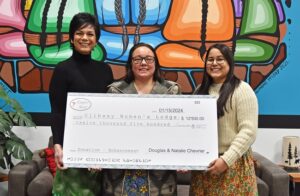Large donation gifted to Ojibway Women’s Lodge
Trigger warning: readers may be triggered by the subject matter of domestic violence. Community Assistance Program (CAP) can be accessed for citizens of the Anishinabek Nation: 1-800-663-1142.

By Kelly Anne Smith
NIPISSING FIRST NATION— A big cheque from a Nipissing First Nation business couple will help women and children in crisis seeking refuge at the Ojibway Women’s Lodge.
Acting Supervisor of Ojibway Women’s Lodge Melissa Stevens says the cash donation will go far in extra support for those fleeing an abusive relationship.
“It means we are able to offer that much more to our clients when they have to access food banks and services like that, and it only goes so far throughout the month.”
Stevens accepted the $12,500 cheque from Natalie Payette-Chevrier and Douglas Chevrier of Nipissing First Nation who operate Eagle’s Nest Gas Bar, Golden Harvest, and Mukwa Studios.
Impressed by Nipissing First Nation photographer Les Couchie’s skill in capturing images of eagles and birds, Natalie Payette-Chevrier approached Couchie to provide photographs for a fundraising calendar on behalf of the Ojibway Women’s Lodge.
“Les helped me bring them to Cassellholme and various locations. I was going to match what was fundraised. We were trying to get a least $6,000; that didn’t happen, but what I’ve done is I’ve drafted a cheque for $12,500 and wanted to give it to them for enhancement for whatever they choose to use it for, which is going directly to the Ojibway Women’s Lodge.”
Outreach Worker and Crisis Support Brooklyn Penasse of the Ojibway Women’s Lodge says the monetary gift will assist those who have to start brand-new in setting up a new home.
“It’s really expensive to cover the costs for the start-up for new homes or apartments. People have to start from scratch, so this will really help them.”
“Bedding, utensils, those things that if they are on assistance, that won’t let them cover it. They have to buy food. They have to pay their rent. So, a shower curtain or a little rug and extra toilet paper – it’s all important stuff that everybody needs. It goes to that,” adds Stevens.
Cash donations are best for the Ojibway Women’s Lodge, which has limited storage space, then Penasse says, the essentials can be purchased quickly.
“Cash donations are best because the people in the house, maybe they don’t have children and sometimes we have a lot of children. It depends on the dynamic of the home.”
Stevens adds that having independence over their own funds is important for women leaving a crisis situation.
“We can get what is needed. Sometimes it’s a lot of gift cards. It does help them out. They are able to get what they need, if it’s on sale, too, it’s helpful.”
Stevens says the Ojibway Women’s Lodge is a 10-bed facility.
“We take anyone who presents as women. I know when people do call in, they think it’s just for Indigenous women, but it’s for anybody, all women, anybody that identifies as a woman.”
Wildlife photographer Les Couchie was happy to provide images for the calendar. And his help goes back decades.
“I think all things come in a circle. I was the employee with Nipissing First Nation who got the women’s centre way back in 1984. And an interesting side-story is with the gentleman I was working with, Joseph Tschirky. Joseph was one of eight provincial employees who quit because the government was not spending money on [Indigenous] people that they had budgeted. Thankfully, he got his job back, but he was very, very determined with this project. So much so that we made the rules work. Right near the end of the year, we were applying, he called me and he says, “Can you put in a foundation, even though we don’t have the money? I said, ‘Sure’ and I got the Chief to agree and we put the foundation in. So, on the 30th of March, the MP for Parry Sound Miller had withdrawn their application, moving it to ’85. Joseph said, ‘I know a First Nation that is ready to go.’ Incredibly, Joseph was still doing great things for [Indigenous] people. He died an unsung hero.”
Women in crisis can call the Ojibway Women’s Lodge 24 hours a day, seven days a week, at 705-472-3321.


